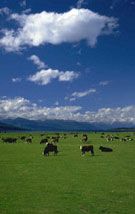|
We understand that the beef industry has nearly perfected a hydroponic cow—if only the cows could figure out how to use the long straws...
OK, we made that up, but there are indeed some crazy things going on in the beef industry. In the last Eco-Logical, we talked about how baby cows are fed formula that includes cow's blood and how feedlot cows have their feed mixed with slaughterhouse waste. Now for the real shocker: Mad cow disease—also known as bovine spongiform encephalopathy (BSE)—started in England after slaughterhouse waste from infected sheep was fed to cattle. The practice of feeding slaughterhouse waste to cattle has now been banned in Europe but is still allowed (and is prevalent) in North America.
BSE is not a contagious disease; it cannot spread via cow-to-cow contact. The infectious agent can get into a cow only when BSE-infected tissue or tissue products are added to the animal's feed.
 The UD Department of Agriculture claims to have an "aggressive" surveillance program, with 19,990 head of cattle tested in fiscal year 2002. Critics point out that this is less than one-tenth of one percent of the 96 million head of cattle in the US that year, and that it wasn't until much higher levels of testing were instituted in Europe that the EU was able to determine that they did indeed have a BSE problem. The USDA states that its surveillance program focuses its testing on animals that exhibit characteristics that could indicate BSE, but they also admit that some BSE infections can be mild, resulting in a longer incubation period (and meaning that observable symptoms might not be present yet). This could make animals with low-grade infections unlikely to be tested.
The UD Department of Agriculture claims to have an "aggressive" surveillance program, with 19,990 head of cattle tested in fiscal year 2002. Critics point out that this is less than one-tenth of one percent of the 96 million head of cattle in the US that year, and that it wasn't until much higher levels of testing were instituted in Europe that the EU was able to determine that they did indeed have a BSE problem. The USDA states that its surveillance program focuses its testing on animals that exhibit characteristics that could indicate BSE, but they also admit that some BSE infections can be mild, resulting in a longer incubation period (and meaning that observable symptoms might not be present yet). This could make animals with low-grade infections unlikely to be tested.
The USDA and FDA contend that a 1997 regulation prohibiting feeding of most mammalian proteins to ruminants should be enough to ensure that cows in the US don't contract BSE. However, there are still several back doors through which the disease could hit US cows:
- Blood and fat from rendered cow wastes are still allowed in cattle feed. (The USDA thinks these substances cannot transmit the infectious agent, but there is no guarantee.)
- The 1997 regulation allows the cow parts that are banned from cow feed to still be used in feed for pigs or chickens. Slaughterhouse waste from those animals can then legally be fed back to cows.
- Pet food can contain slaughterhouse waste. Expired pet food occasionally ends up in cattle feed.
It's not much of a stretch to think that there is risk in allowing these potential sources of BSE to continue to be used in cattle feed. One critic of US policy is John Stauber, who has been studying BSE for more than a decade. Stauber thinks it's possible that BSE is already spreading in the US "under the radar" of the USDA's tests. He recommends that the US implement a complete ban on slaughterhouse waste in animal feed, just as Europe did after the horrible outbreak there in the 1990s.
Since a BSE variant can be transferred to humans—USA Today reports that at least 150 people worldwide have died from the disease since 1996—it's wise to be cautious. The best way to guarantee you're getting beef from BSE-free cows—and not supporting the horrific feeding practices used by the mainstream beef industry—is to buy grass-fed beef, preferably organic. There is also "natural" beef, whose labels often state that animals were raised "without animal byproducts." This is also a better choice than standard supermarket beef, but be sure to read the label carefully since the term "natural" is not regulated and is open to interpretation and abuse. Finally, consider soy-based beef
|


